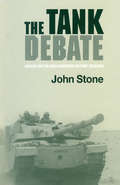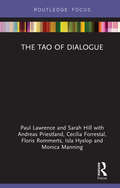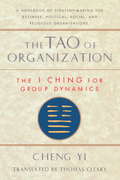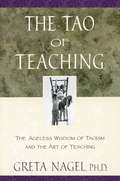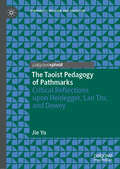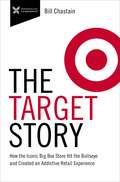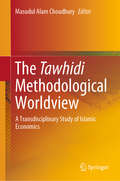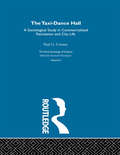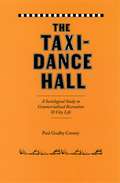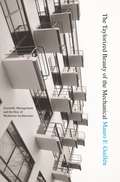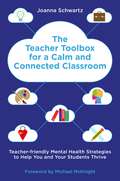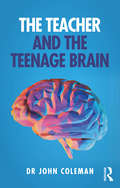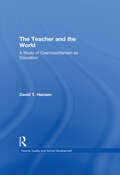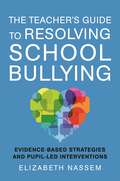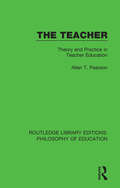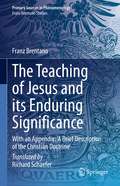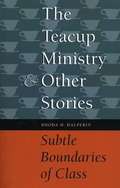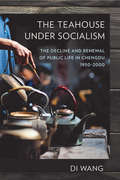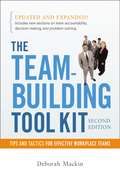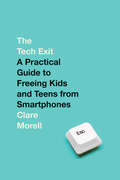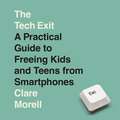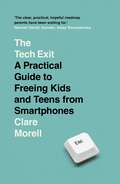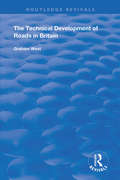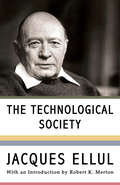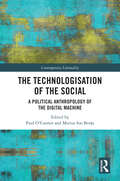- Table View
- List View
The Tank Debate: Armour and the Anglo-American Military Tradition
by John StoneIn The Tank Debate, John Stone highlights the equivocal position that armour has traditionally occupied in Anglo-American thought, and explains why - despite frequent predictions to the contrary - the tank has remained an important instrument of war. This book provides a timely and provocative study of the tank's developmental history, against the changing background of Anglo-American military thought.
The Tao of Dialogue (Routledge Focus on Mental Health)
by Paul Lawrence Sarah Hill Andreas Priestland Cecilia Forrestal Floris Rommerts Isla Hyslop Monica ManningContemporary writers position ‘dialogue’ at the heart of change theory, but what do we mean by ‘dialogue’? The Tao of Dialogue explains through story what dialogue means, and how to leverage dialogic principles in managing relationships within the workplace. Accessible and innovative, The Tao of Dialogue explains the basic principles of dialogue, defined as a way of thinking and reflecting together with others, through the story of Michael, the CEO of a company about to embark on a life-changing journey. In the first half of the book, he is introduced to the idea of dialogue by Hannah, an internal change practitioner working within the organisation. He is encouraged to engage in dialogue with those he seeks to influence, which requires him to examine his mindset and proactively make changes to the ways in which he is communicating with his team and the wider organisation. In the second half of the book Michael is assisted by Mark, an external consultant with expertise in dialogic team and organisational development, who helps him apply dialogic principles to leading his team. Engaging yet practical, each part concludes with a summary of the dialogue that has taken place and how the model can be used in the real world, as well as an overview of the journey of the organisation, team and individuals. Emerging from dialogue between seven experienced, international coaches, The Tao of Dialogue will be of interest to coaches in practice and training, as well as business leaders, HR and L&D professionals and consultants. It explains in simple terms how to transform human relationships, both one-to-one and team/group. It will also appeal to academics and students of coaching, executive development, change management and leadership development.
The Tao of Organization: The I Ching for Group Dynamics
by Thomas ClearyOf particular interest for its application to business strategizing, this edition of the well-known ancient Chinese classic I Ching (The Book of Changes) guides readers through the intricacies of group dynamics and relationships within organizations of all kinds. The root text is supported by a commentary from the eleventh-century scholar Cheng Yi, founder of the movement known as Lixue, the "study of inner design." Cheng contended that by understanding the pattern of events--the inner design of nature--one can bring about mutual understanding and cooperation among people in groups, thus facilitating the accomplishment of any tasks they might undertake. The translator's extensive introduction gives specific, systematic guidelines for consulting the I Ching for greatest understanding and best results. Included in the afterword is a profile of the modern and Japanese organizational genius Matsushita Konosuke, founder of Panasonic and other multinational corporations, whose success has been built on the principles of the I Ching.
The Tao of Teaching: The Ageless Wisdom of Taoism and the Art of Teaching
by Greta K. NagelThe Tao of Teaching is for teachers, parents, and any others who are looking for a book of wisdom on how to deal with people, especially children, in a learning environment. The Tao of Teaching is written in the same style as the Tao Te Ching, and gives examples from the classrooms of three present-day teachers whom the author feels embody Taoist wisdom and "student-centered" educational methods. The Tao of Teaching is a labor of love, containing many important insights by a talented and respected professional whose emphasis is on the students' contribution in a learning environment, whatever the context.
The Taoist Pedagogy of Pathmarks: Critical Reflections Upon Heidegger, Lao Tzu, And Dewey (Spirituality, Religion, and Education)
by Jie YuBased on the intertwined complex conversations among Heidegger, Dewey, and Lao Tzu, this book explores the possibilities of the Taoist Pedagogy of Pathmarks as a clearing between truth and untruth, responding to the spiritual call of Tao as inaction and teaching as releasement. In this book, Yu provides a critical exploration of the rich dynamics in the “direct” conversations among the three great thinkers of east and west, highlighting the implications of their ideas for education throughout. As more educational researchers, teacher educators, and teachers recognize the limitations of didactic teaching-as-telling, the author brings an alternate pathway to light.
The Target Story: How the Iconic Big Box Store Hit the Bullseye and Created an Addictive Retail Experience (The Business Storybook Series)
by Bill ChastainImagine if you could be a fly on the wall as a family enterprise becomes one of the most successful companies in the world. The Target Story will help you understand and adopt the competitive strategies, workplace culture, and daily business practices that enabled the big box store to become the retail giant it is today. In an industry that has seen constant disruption over the last two decades, Target has experienced tremendous growth. Establishing a strong eCommerce business and cultivating a sought-after in-store experience has kept this iconic brand at the top of the retail game. From same-day fulfillment to brand partnerships, Target has successfully fought the domination of online marketplaces by thinking outside the big box. The growth, prosperity, and expansion strategies that can be gleaned from the history of the Target Corporation amounts to a masterclass in business. Yet, the Target story has never been adequately presented. Until now. Through the story of Target, you’ll learn: How to remain nimble in times of tremendous change. How to reinvent a six-decade-old iconic brand. How to know when to build it yourself or bring in the experts. When to change the entire way you do business. And much, much more.
The Tawhidi Methodological Worldview: A Transdisciplinary Study of Islamic Economics
by Masudul Alam ChoudhuryThis book develops and applies the methodology of Tawhid (“monotheism”) as law and the Sunnah (the teachings of Prophet Muhammad) in the Qur’an in establishing a transdisciplinary foundation for the study of Islamic economics, finance, society, and science. It employs the Tawhidi String Relation (TSR), a new theoretical framework in contemporary Islamic sciences, in the methodological formalisation and application of the Tawhidi worldview - as the primal ontological law of monotheism. It employs a deeply Qur’anic exegesis, and a mathematical, philosophical, and socio-scientific mode of inquiry in deriving, developing, and empirically applying the Qur’anic methodology of “unity of knowledge”. It is the first book of its kind in rigorously studying the true foundation of the Qur’anic concept of ‘everything’ - as the world-system extending between the heavens and Earth. The qur’anic terminology of the precept of this “world-system” in its most comprehensive perspective is A’lameen, the terminology in the Qur’an that accounts for the generality and details of the world-systems that are governed by the method of evaluation of the objective criterion of wellbeing. Wellbeing objective criterion is evaluated subject to inter-causal relations between systemic entities, variables, and functions. The cardinal principle of Tawhid in its relationship with the world-system conveys the corporeal meaning of monotheism in its cognitive implication of abstraction and application. Such a study has not been undertaken in existing Islamic socio-scientific literature in analysing Islamic economics, finance, science, and society collectively, using Tawhidi law as a theoretical framework. This book will be relevant to all such scholars who are interested in studying the monotheistic law and the Islamic principles, particularly Tawhid, Shari’ah, and Islamic philosophical thought.
The Taxi-Dance Hall (The\making Of Sociology Ser.)
by Paul G. CresseyFirst published in 2003. This is Volume II of eight in the Early Sociology of Culture collection and offers a sociological study on the commercialized recreation. Paul G. Cressey while serving as a case-worker and special investigator for the Juvenile Protective Association was requested during the summer of 1925 to report upon the new and then quite unfamiliar closed dance halls. This book is in a sense the outgrowth of those assignments.
The Taxi-Dance Hall: A Sociological Study in Commercialized Recreation and City Life
by Paul G. CresseyFirst published in 1932, The Taxi-Dance Hall is Paul Goalby Cressey’s fascinating study of Chicago’s urban nightlife—as seen through the eyes of the patrons, owners, and dancers-for-hire who frequented the city’s notoriously seedy “taxi-dance” halls. Taxi-dance halls, as the introduction notes, were social centers where men could come and pay to dance with “a bevy of pretty, vivacious, and often mercenary” women. Ten cents per dance was the usual fee, with half the proceeds going to the dancer and the other half to the owner of the taxi-hall. Cressey’s study includes detailed maps of the taxi-dance districts, illuminating interviews with dancers, patrons, and owners, and vivid analyses of local attempts to reform the taxi-dance hall and its attendees. Cressey’s study reveals these halls to be the distinctive urban consequence of tensions between a young, diverse, and economically independent population at odds with the restrictive regulations of Prohibition America. Thick with sexual vice, ethnic clashes, and powerful undercurrents of class, The Taxi-Dance Hall is a landmark example of Chicago sociology, perfect for scholars and history buffs alike.
The Taylorized Beauty of the Mechanical: Scientific Management and the Rise of Modernist Architecture (Princeton Studies in Cultural Sociology #10)
by Mauro F. GuillénThe dream of scientific management was a rationalized machine world where life would approach the perfection of an assembly line. But since its early twentieth-century peak this dream has come to seem a dehumanizing nightmare. Henry Ford's assembly lines turned out a quarter of a million cars in 1914, but all of them were black. Forgotten has been the unparalleled new aesthetic beauty once seen in the ideas of Ford and scientific management pioneer Frederick Winslow Taylor. In The Taylorized Beauty of the Mechanical, Mauro Guillén recovers this history and retells the story of the emergence of modernist architecture as a romance with the ideas of scientific management--one that permanently reshaped the profession of architecture. Modernist architecture's pioneers, Guillén shows, found in scientific management the promise of a new, functional, machine-like--and beautiful--architecture, and the prospect of a new role for the architect as technical professional and social reformer. Taylor and Ford had a signal influence on Bauhaus founder Walter Gropius and on Le Corbusier and his Towards a New Architecture, the most important manifesto of modernist architecture. Architects were so enamored with the ideas of scientific management that they adopted them even when there was no functional advantage to do so. Not a traditional architectural history but rather a sociological study of the profession of architecture during its early modernist period, The Taylorized Beauty of the Mechanical provides a new understanding of the degree to which modernist architecture emerged from a tradition of engineering and industrial management.
The Teacher Toolbox for a Calm and Connected Classroom: Teacher-Friendly Mental Health Strategies to Help You and Your Students Thrive
by Joanna SchwartzThe Teacher Toolbox for a Calm and Connected Classroom is a whole-child, whole-hearted approach to teaching, wellness, and student--teacher relationships.Chock-full of practical advice and brain-based tools from an experienced teacher and counselor, this book solves the question of how psychology and education can enrich and empower both teachers and students' wellness. Peppered with relatable anecdotes from the authors' experiences, the book deals with how to help unpack the' "invisible backpack" that both teachers and students bring into the classroom. Chapters are broken down to show how to practically address common issues such challenging behavior, social-emotional learning, trauma-informed education, attachment theory, mindfulness, mental health and much more. Each chapter outlines these common challenges but also provides an abundance of practical tools that can be used to help. Written accessibly, and with tools which are easy to implement, The Teacher Toolbox for a Calm and Connected Classroom is an indispensable guide for any teacher.
The Teacher and the Teenage Brain
by John ColemanThe Teacher and the Teenage Brain is essential reading for all teachers and students of education. This book offers a fascinating introduction to teenage brain development and shows how this knowledge has changed the way we understand young people. It provides a critical insight into strategies for improving relationships in the classroom and helping both adults and teenagers cope better with this stage of life. Dr John Coleman shows how teachers and students can contribute to healthy brain development. The book includes information about memory and learning, as well as guidance on motivation and the management of stress. Underpinned by his extensive work with schools, Dr Coleman offers advice on key topics including the importance of sleep, the social brain, moodiness, risk and risk-taking and the role of hormones. This book is extensively illustrated with examples from classrooms and interviews with teachers. It explicitly links research and practice to create a comprehensive, accessible guide to new knowledge about teenage brain development and its importance for education. Accompanied by a website providing resources for running workshops with teachers and parents, as well as an outline of a lesson plan for students, The Teacher and the Teenage Brain offers an innovative approach to the understanding of the teenage brain. This book represents an important contribution to teacher training and to the enhancement of learning in the classroom.
The Teacher and the World: A Study of Cosmopolitanism as Education (Teacher Quality and School Development)
by David T. HansenWinner of the 2013 American Educational Studies Association's 2013 Critics Choice Award! Teachers the world over are seeking creative ways to respond to the problems and possibilities generated by globalization. Many of them work with children and youth from increasingly varied backgrounds, with diverse needs and capabilities. Others work with homogeneous populations and yet are aware that their students will encounter many cultural changes in their lifetimes. All struggle with the contemporary conditions of teaching: endless top-down measures to manipulate what they do, rapid economic turns and inequality in supportive resources that affect their lives and those of their students, a torrent of media stimuli that distract educational focus, and growth as well as shifts in population. In The Teacher and the World, David T. Hansen provides teachers with a way to reconstruct their philosophies of education in light of these conditions. He describes an orientation toward education that can help them to address both the challenges and opportunities thrown their way by a globalized world. Hansen builds his approach around cosmopolitanism, an ancient idea with an ever-present and ever-beautiful meaning for educators. The idea pivots around educating for what the author calls reflective openness to new people and new ideas, and reflective loyalty toward local values, interests, and commitments. The book shows how this orientation applies to teachers at all levels of the system, from primary through university. Hansen deploys many examples to illustrate how its core value, a balance of reflective openness to the new and reflective loyalty to the known, can be cultivated while teaching different subjects in different kinds of settings. The author draws widely on the work of educators, scholars in the humanities and social sciences, novelists, artists, travellers and others from both the present and past, as well as from around the world. These diverse figures illuminate the promise in a cosmopolitan outlook on education in our time. In this pioneering book, Hansen has provided teachers, heads of school, teacher educators, researchers, and policy-makers a generative way to respond creatively to the pressure and the promise of a globalizing world.
The Teacher's Guide to Resolving School Bullying: Evidence-Based Strategies and Pupil-Led Interventions
by Elizabeth NassemDrawing on the author's cutting-edge research this practical book helps teachers better understand the causes of bullying, gives them confidence to resolve nuanced cases, and provides them with the tools to develop pupil-led anti-bullying campaigns. This book delves into the complex nature of bullying at school in a clear and approachable way. It helps school staff understand the student's views and experiences of bullying, and how power imbalances and systemic inequalities can contribute to bullying relationships between pupils. The author provides evidence-based interventions that suggest ways teachers can develop knowledge and skills to resolve incidents. Key to this is a new approach to pupil-led interventions which allows staff to harness pupil voices to develop effective anti-bullying strategies. Included are resources and tools to help teachers set up these advisory groups and interventions, and train others to do the same. This is essential reading for teachers looking for a comprehensive and accessible guide to tackling bullying.
The Teacher: Theory and Practice in Teacher Education (Routledge Library Editions: Philosophy of Education #15)
by Allen T. PearsonIt is widely agreed that teacher education must consist of two general components. There is a knowledge component which contains specialized subject matter knowledge, and a practical component in which intending teachers develop skills and abilities. In this original and compelling work, first published in 1989, Pearson attempts to examine the connection between the two. This title will be of interest to students of education.
The Teaching of Jesus and its Enduring Significance: With an Appendix: 'A Brief Description of the Christian Doctrine' (Primary Sources in Phenomenology)
by Franz BrentanoHere, for the first time in English, is Franz Brentano’s The Teaching of Jesus, a compendium of texts Brentano assembled for publication shortly before his death that constitute a frank, public settling of accounts with the Christian religion. Originally conceived by Brentano as a volume that might help others similarly led to doubt the doctrines of Christianity, the book is remarkably free of bitterness or spitefulness. On the contrary, what makes the book of singular importance, especially now, is its careful attempt at taking stock of the positive and negative influence Christianity has had in history. This text appeals to those researchers and scholars interested in the work of Franz Brentano and his work on the philosophy of religion, in this case, Christianity.
The Teacup Ministry & Other Stories: Subtle Boundaries of Class
by Rhoda H. HalperinIn the global world of the twenty-first century, class boundaries are subtle and permeable, though real nonetheless. Markers of identity, authenticity, and belonging can change with a gesture or a glance, making people feel they do or don't belong in certain places, with certain people, at certain times. In these powerfully written ethnographic stories, Rhoda Halperin maps the boundaries of class by examining three themes: crossing class boundaries, class creativity, and class vulnerability. In telling these stories, Halperin draws on a wealth of ethnographic experiences in this country and abroad. Her book challenges class stereotypes in ways that touch on universals across cultures and over time. Rhoda H. Halperin is Professor of Anthropology at the University of Cincinnati. Her previous books include Practicing Community: Class Culture and Power in an Urban Neighborhood, Cultural Economies Past and Present, and The Livelihood
The Teahouse under Socialism: The Decline and Renewal of Public Life in Chengdu, 1950–2000
by Di WangTo understand a city fully, writes Di Wang, we must observe its most basic units of social life. In The Teahouse under Socialism, Wang does just that, arguing that the teahouses of Chengdu, the capital of Sichuan Province, are some of the most important public spaces—perfect sites for examining the social and economic activities of everyday Chinese.Wang looks at the transformation of these teahouses from private businesses to collective ownership and how state policy and the proprietors’ response to it changed the overall economic and social structure of the city. He uses this transformation to illuminate broader trends in China’s urban public life from 1950 through the end of the Cultural Revolution and into the post-Mao reform era. In doing so, The Teahouse under Socialism charts the fluctuations in fortune of this ancient cultural institution and analyzes how it survived, and even thrived, under bleak conditions.Throughout, Wang asks such questions as: Why and how did state power intervene in the operation of small businesses? How was "socialist entertainment" established in a local society? How did the well-known waves of political contestation and struggle in China change Chengdu’s teahouses and public life? In the end, Wang argues, the answers to such questions enhance our understanding of public life and political culture in the Communist state.
The Team-Building Tool Kit: Tips and Tactics for Effective Workplace Teams
by Deborah MackinThis helpful guide provides practical advice to guide team coaches, leaders, and members to high-performance results.Workplace teams learn to function as effective units when they have the tools and techniques to be greater than the sum of their parts. Filled with bullet points to make tips and strategies quick and easy to grasp, this book covers both the structure and nitty-gritty process details that so often derail even the best teams.In The Team-Building Tool Kit, you will learn how to:have effective team meetingsimprove accountability for results and team member behaviorassess team performanceresolve team conflictsrecognize the pitfalls that affect decision makingtrain for high performancedesign a plan for implementation Featuring new sections on team accountability, decision making, and problem solving, The Team-Building Tool Kit is a must-have for every team library.
The Tech Exit: A Practical Guide to Freeing Kids and Teens from Smartphones
by Clare MorellA road map to free your kids from the harms of digital technology and to recover the beauty, wonder, and true purpose of childhood—by a leading tech policy expert&“We know smartphones can be harmful to kids and teens, but what can we do about it? In this indispensable guide, Clare Morell documents the solutions that actually work.&”—Cal Newport, author of Slow Productivity and Digital MinimalismIt&’s no secret that addictive digital technologies like smartphones and social media apps are harming a generation of kids socially, mentally, and even physically. But a workable solution seems elusive. After all, don&’t kids need phones, and won&’t they be vulnerable or socially isolated without tech?Clare Morell, fellow at the Ethics and Public Policy Center and director of its Technology and Human Flourishing Project, argues that the answer is no. She exposes the lies parents have been sold about managing the dangers of tech through parental controls and screen-time limits, and demonstrates that another way is possible—even if your children are already using smartphones or social media.The Tech Exit maps a doable pathway to freedom from digital technology for families, local communities, and society. Drawing on dozens of interviews with experts and with families who have gone tech-free, as well as Morell&’s own work as a policy expert, The Tech Exit shows how digital technology is anything but necessary for children to live happy, healthy, and socially full lives.The Tech Exit is essential reading for any parent who has felt stuck between an awareness of the dangers of digital technology for kids and the feeling that tech is necessary and inevitable. Clare Morell&’s message is simple and compelling: You and your family can be free. The life you want for your children is within reach.
The Tech Exit: A Practical Guide to Freeing Kids and Teens from Smartphones
by Clare MorellIt's no secret that addictive digital technologies like smartphones and social media apps are harming a generation of kids socially, mentally, and even physically. But a workable solution seems elusive. After all, don't kids need phones, and won't they be vulnerable or socially isolated without tech?Clare Morell, fellow at the Ethics and Public Policy Center and director of its Technology and Human Flourishing Project, argues that the answer is 'no'. She exposes the lies parents have been sold about managing the dangers of tech through parental controls and screen-time limits, and demonstrates that another way is possible - even if your children are already using smartphones or social media.The Tech Exit maps a doable pathway to freedom from digital technology for families, local communities, and society. Drawing on dozens of interviews with experts and with families who have gone tech-free, as well as Morell's own work as a policy expert, The Tech Exit shows how digital technology is anything but necessary for children to live happy, healthy, and socially full lives.The Tech Exit is essential reading for any parent who has felt stuck between an awareness of the dangers of digital technology for kids and the feeling that tech is necessary and inevitable. Clare Morell's message is simple and compelling: You and your family can be free. The life you want for your children is within reach.
The Tech Exit: A Practical Guide to Freeing Kids and Teens from Smartphones
by Clare MorellIt's no secret that addictive digital technologies like smartphones and social media apps are harming a generation of kids socially, mentally, and even physically. But a workable solution seems elusive. After all, don't kids need phones, and won't they be vulnerable or socially isolated without tech?Clare Morell, fellow at the Ethics and Public Policy Center and director of its Technology and Human Flourishing Project, argues that the answer is 'no'. She exposes the lies parents have been sold about managing the dangers of tech through parental controls and screen-time limits, and demonstrates that another way is possible - even if your children are already using smartphones or social media.The Tech Exit maps a doable pathway to freedom from digital technology for families, local communities, and society. Drawing on dozens of interviews with experts and with families who have gone tech-free, as well as Morell's own work as a policy expert, The Tech Exit shows how digital technology is anything but necessary for children to live happy, healthy, and socially full lives.The Tech Exit is essential reading for any parent who has felt stuck between an awareness of the dangers of digital technology for kids and the feeling that tech is necessary and inevitable. Clare Morell's message is simple and compelling: You and your family can be free. The life you want for your children is within reach.
The Technical Development of Roads in Britain (Routledge Revivals)
by Graham WestThis title was first published in 2003. The history of roads in Great Britain has not been one of steady development, but rather, one that has waxed and waned in response to social, military and economic needs, and also as to whether there have been alternative methods of transport available. Paralleling this, the technical aspects of road construction - with the one great exception of Roman roads - can be seen as a fitful progression of improvement followed by neglect as the roadmaker has responded, albeit tardily on occasion, to the needs of the road user. This text describes the technical development of British roads in relation to the needs of the time, and thereby touches upon its relation to the history of the country more generally.
The Technological Society
by Jacques EllulAs insightful and wise today as it was when originally published in 1954, Jacques Ellul's The Technological Society has become a classic in its field, laying the groundwork for all other studies of technology and society that have followed. Ellul offers a penetrating analysis of our technological civilization, showing how technology—which began innocuously enough as a servant of humankind—threatens to overthrow humanity itself in its ongoing creation of an environment that meets its own ends. No conversation about the dangers of technology and its unavoidable effects on society can begin without a careful reading of this book. "A magnificent book . . . He goes through one human activity after another and shows how it has been technicized, rendered efficient, and diminished in the process.&”—Harper's &“One of the most important books of the second half of the twentieth-century. In it, Jacques Ellul convincingly demonstrates that technology, which we continue to conceptualize as the servant of man, will overthrow everything that prevents the internal logic of its development, including humanity itself—unless we take necessary steps to move human society out of the environment that 'technique' is creating to meet its own needs.&”—The Nation &“A description of the way in which technology has become completely autonomous and is in the process of taking over the traditional values of every society without exception, subverting and suppressing these values to produce at last a monolithic world culture in which all non-technological difference and variety are mere appearance.&”—Los Angeles Free Press
The Technologisation of the Social: A Political Anthropology of the Digital Machine (Contemporary Liminality)
by Paul O’Connor and Marius Ion BențaIn an era of digital revolution, artificial intelligence, big data and augmented reality, technology has shifted from being a tool of communication to a primary medium of experience and sociality. Some of the most basic human capacities are increasingly being outsourced to machines and we increasingly experience and interpret the world through digital interfaces, with machines becoming ever more ‘social’ beings. Social interaction and human perception are being reshaped in unprecedented ways. This book explores this technologisation of the social and the attendant penetration of permanent liminality into those aspects of the lifeworld where individuals had previously sought some kind of stability and meaning. Through a historical and anthropological examination of this phenomenon, it problematises the underlying logic of limitless technological expansion and our increasing inability to imagine either ourselves or our world in other than technological terms. Drawing on a variety of concepts from political anthropology, including liminality, the trickster, imitation, schismogenesis, participation, and the void, it interrogates the contemporary technological revolution in a manner that will be of interest to sociologists, social and anthropological theorists and scholars of science and technology studies with interests in the digital transformation of social life.
